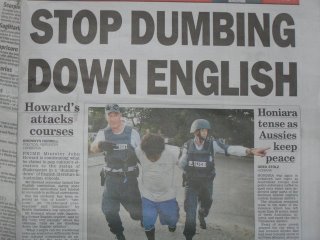
Here is a photo of the front page of today's Advertiser.
Note the sub-heading under the lead story with what may be a greengrocer's apostrophe attached to the PM's family name.
This solecism is not still on the website (if it ever was), but the text of the article by Bronwyn Hurrell is.
To me, reading between her lines (or should I say "deconstructing her text"?), at one point she seems to be implying that Mr and Mrs Howard are of one mind on these matters, and that that mind is Mrs Howard's, not the PM's:
Mr Howard, whose wife, Janette, is a former English teacher, said he felt "very, very strongly" about the criticism "that we are dumbing down the English syllabus".
said SA "supports a curriculum that teaches reading, writing, grammar and communication and uses a range of texts, including traditional literature. It is vital that the enjoyment and value of reading is promoted to students."
See anything wrong with the last sentence?
This shows that, notwithstanding my suspicion of the PM's motives for raising the matter I have some sympathy for the Howards' (should it be Howards's?) position.Anyway, for a more balanced view than theirs, read David Williamson's piece in Crikey. The first two paragraphs sum up his view:
I think John Howard's position is too absolutist, but being concerned about the way literature appears to be being taught is legitimate. In the mid-nineties I penned a satire directed at the excesses of postmodern literary theory called Dead White Males. It was a big box office success but drew the wrath of postmodern academics like the ones I had satirised.I was accused of being deeply conservative and not understanding that the human consciousness is formed and controlled by the ideologies contained in "texts". The theory posited that so called imaginative fiction was no more than ideology promoting the national, class, race and gender positions of the author. What annoyed me about such a smug analysis was not that it didn't contain SOME truth, but that it was being taught as if it was a TOTAL truth.
Peter Craven in The Age also thinks along similar lines:
YOU don't have to agree with the Prime Minister about much else to think that he's on the side of the angels on this one.
"Postmodern" gets used to mean a lot of different things, but the worry that John Howard is reflecting (whether he understands it or not) is based on the postmodernist notion that everything is relative, that there is no aesthetic value that's not illusory, and that our kids might as well be studying any old aspect of pop culture — episodes of Neighbours, cartoons, you name it — rather than King Lear or the poetry of Keats.
Now, there's nothing necessarily wrong with people studying (preferably in media courses) the things they're going to entertain themselves with, but when it comes to literature, it's important that we hang on to the idea that some pieces of work have got more going for them than others.
It's crucially important that we don't lose our sense of the value of the literary classics. This doesn't have to be inert or set in stone. And, of course, we can only read Shakespeare or Joyce or whatever it is as people living now, but that shouldn't delude us into thinking that one thing's as good as another.


No comments:
Post a Comment